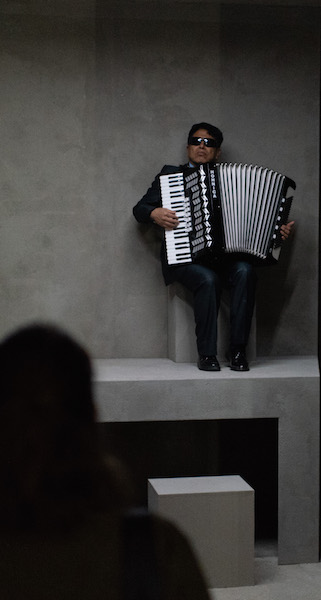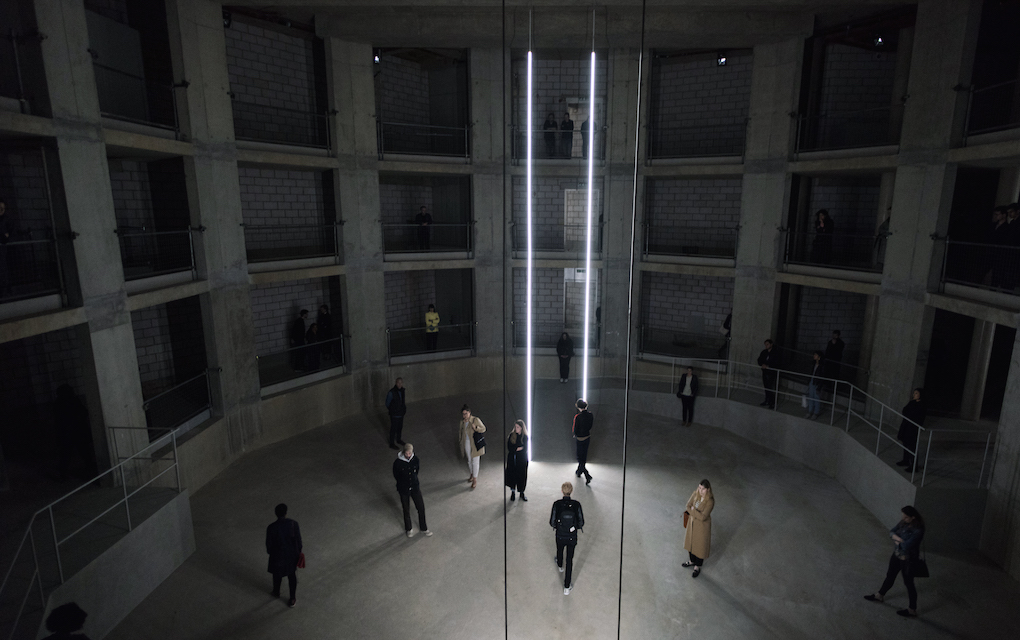Taryn Simon: An Occupation of Loss, Islington Green review - divine lamentation | reviews, news & interviews
Taryn Simon: An Occupation of Loss, Islington Green review - divine lamentation
Taryn Simon: An Occupation of Loss, Islington Green review - divine lamentation
A journey to the underworld in song

What a superb location for a performance! The flats on the north-east corner of Islington Green back onto a crummy atrium from which a staircase leads down to a vaulted, concrete pit (pictured below).
Peering over the topmost balustrade, one sees silent figures entering the subterranean space through portals created with slender rods of light. Most are dressed in black; they are professional mourners flown in from all over the world by American artist Taryn Simon to perform their lamentations in this dismal place, which feels like an anti-chamber to Hell.
 They move to various locations on the levels below and, at the sudden prompting of wooden clappers, begin their incantations. Collectively their voices produce a raucous cacophany that draws you inexorably down to the lower levels to discover the mourners standing or sitting on minimalist sets dotted around the periphery. Each designated space is like a shrine, in which you stand very close to performers who assiduously ignore you.
They move to various locations on the levels below and, at the sudden prompting of wooden clappers, begin their incantations. Collectively their voices produce a raucous cacophany that draws you inexorably down to the lower levels to discover the mourners standing or sitting on minimalist sets dotted around the periphery. Each designated space is like a shrine, in which you stand very close to performers who assiduously ignore you.
I expected to be deeply moved by their keening, but in the absence of any bodies or the ritual trappings of a funeral, the experience is surprisingly abstract. The laments are in languages as various as Ghanaian, Kurmanji, Wayuu, Darghin and Greek. But I began to notice that, despite being in different languages and coming from diverse cultural backgrounds, these strangely beautiful recitations share many similar rhythms and cadences.
A blind man from Ecuador (pictured above right, Hugo Anibal) plays an accordion while singing an almost jaunty lament; most are very solemn, though, and contain suggestions of anger as well as grief and loss. Dressed in white, a Han Chinese woman kneels before an altar-like table, gesticulating dramatically as she wails into a microphone. Whereas this feels like a performance, the others are far more inscrutable. Two women from Venezuela (main picture) hide themselves beneath patterned cloths, while the Ghanaians keep their eyes tightly shut as they honour the memory of the deceased. Back home, their ceremony might continue for several days, but here everything is over in just half an hour.
The silence that ensues is sudden and profound. The mourners melt back into the darkness leaving one to confront the emptiness that follows such an intensity of sound and to absorb the melancholy of the cavernous space. For An Occupation of Loss is as much a sculptural and architectural experience as it is an aural and emotional one.  Thank you to Artangel, who commissioned this remarkable event and discovered this liminal space so far removed from life above ground. A booklet records the hoops they had to jump through in order to obtain visas for the mourners. Descriptions written for the Home Office by various academics offer useful insights into the social and religious significance of the laments and provide an imaginative alternative to an orthodox catalogue. Powerful stuff!
Thank you to Artangel, who commissioned this remarkable event and discovered this liminal space so far removed from life above ground. A booklet records the hoops they had to jump through in order to obtain visas for the mourners. Descriptions written for the Home Office by various academics offer useful insights into the social and religious significance of the laments and provide an imaginative alternative to an orthodox catalogue. Powerful stuff!
rating
Share this article
The future of Arts Journalism
You can stop theartsdesk.com closing!
We urgently need financing to survive. Our fundraising drive has thus far raised £49,000 but we need to reach £100,000 or we will be forced to close. Please contribute here: https://gofund.me/c3f6033d
And if you can forward this information to anyone who might assist, we’d be grateful.

Subscribe to theartsdesk.com
Thank you for continuing to read our work on theartsdesk.com. For unlimited access to every article in its entirety, including our archive of more than 15,000 pieces, we're asking for £5 per month or £40 per year. We feel it's a very good deal, and hope you do too.
To take a subscription now simply click here.
And if you're looking for that extra gift for a friend or family member, why not treat them to a theartsdesk.com gift subscription?
more Visual arts
 'We are bowled over!' Thank you for your messages of love and support
Much-appreciated words of commendation from readers and the cultural community
'We are bowled over!' Thank you for your messages of love and support
Much-appreciated words of commendation from readers and the cultural community
 Lee Miller, Tate Britain review - an extraordinary career that remains an enigma
Fashion photographer, artist or war reporter; will the real Lee Miller please step forward?
Lee Miller, Tate Britain review - an extraordinary career that remains an enigma
Fashion photographer, artist or war reporter; will the real Lee Miller please step forward?
 Kerry James Marshall: The Histories, Royal Academy review - a triumphant celebration of blackness
Room after room of glorious paintings
Kerry James Marshall: The Histories, Royal Academy review - a triumphant celebration of blackness
Room after room of glorious paintings
 Folkestone Triennial 2025 - landscape, seascape, art lovers' escape
Locally rooted festival brings home many but not all global concerns
Folkestone Triennial 2025 - landscape, seascape, art lovers' escape
Locally rooted festival brings home many but not all global concerns
 Sir Brian Clarke (1953-2025) - a personal tribute
Remembering an artist with a gift for the transcendent
Sir Brian Clarke (1953-2025) - a personal tribute
Remembering an artist with a gift for the transcendent
 Emily Kam Kngwarray, Tate Modern review - glimpses of another world
Pictures that are an affirmation of belonging
Emily Kam Kngwarray, Tate Modern review - glimpses of another world
Pictures that are an affirmation of belonging
 Kiefer / Van Gogh, Royal Academy review - a pairing of opposites
Small scale intensity meets large scale melodrama
Kiefer / Van Gogh, Royal Academy review - a pairing of opposites
Small scale intensity meets large scale melodrama
 Jenny Saville: The Anatomy of Painting, National Portrait Gallery review - a protégé losing her way
A brilliant painter in search of a worthwhile subject
Jenny Saville: The Anatomy of Painting, National Portrait Gallery review - a protégé losing her way
A brilliant painter in search of a worthwhile subject
 Abstract Erotic, Courtauld Gallery review - sculpture that is sensuous, funny and subversive
Testing the boundaries of good taste, and winning
Abstract Erotic, Courtauld Gallery review - sculpture that is sensuous, funny and subversive
Testing the boundaries of good taste, and winning
 Edward Burra, Tate Britain review - watercolour made mainstream
Social satire with a nasty bite
Edward Burra, Tate Britain review - watercolour made mainstream
Social satire with a nasty bite
 Ithell Colquhoun, Tate Britain review - revelations of a weird and wonderful world
Emanations from the unconscious
Ithell Colquhoun, Tate Britain review - revelations of a weird and wonderful world
Emanations from the unconscious
 Rachel Jones: Gated Canyons, Dulwich Picture Gallery review - teeth with a real bite
Mouths have never looked so good
Rachel Jones: Gated Canyons, Dulwich Picture Gallery review - teeth with a real bite
Mouths have never looked so good

Add comment